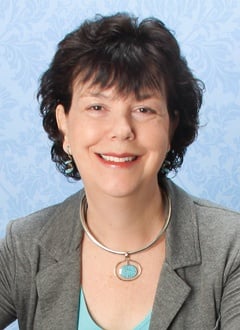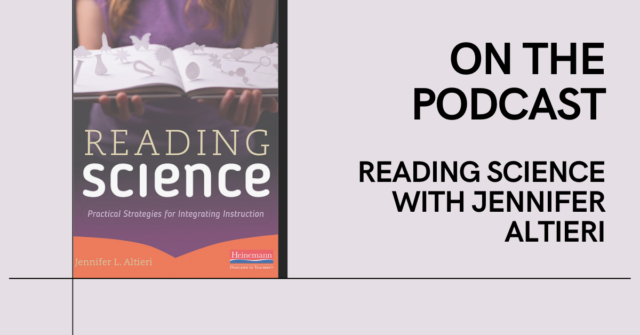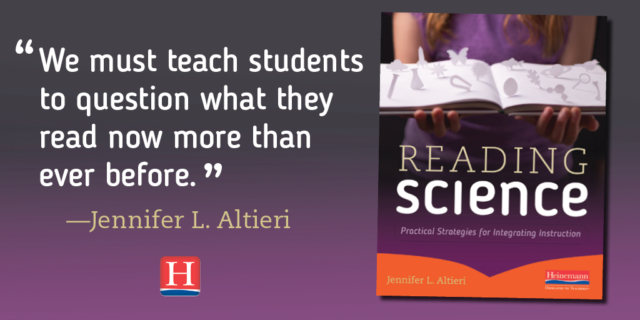
Jennifer Altieri's newest book Reading Science reminds us that literacy skills aren't add-ons to the science class—they're critical parts of instruction. Since science requires specialized literacy demands, students should be prepared not only for today's science class but for the science class of the future and the world at large. In this original post, Jennifer writes that a love of reading is just a start, and that literacy in all areas keeps doors open in the future.
by Jennifer Altieri
I can’t tell you how many times I tell my son that reading will open all types of doors for him. Haven’t we all used that cliché many, many times in our lives? As he sits devouring books, I keep telling him that he will be able to become anything he wants to become once he learns to read. However, after I said that phrase to him for the hundredth time the other day, I stopped and listened to what I was saying. I have heard the saying for years, and yet, I am not sure I believe it. Reading is essential—but will learning words and mastering text in general really open doors for our students? Being able to read certainly increases our options in life, but I am not sure that being able to read words on a page is enough. A general knowledge of reading wasn’t enough for me.
—
I was a good reader of fiction; it even helped me succeed in English classes
—
“She’s a bookworm!” I can remember hearing that statement throughout my years in school. I often had my nose shoved in a book during every free moment. As I look back on my own middle school and high school experience, I now know that being able to read more than my favorite type of text at the time—fiction—was important. Yes, I was a good reader of fiction; it even helped me succeed in English classes. In fact, I spent every spare moment reading both inside and outside the classroom. But I also struggled with a lot of content area learning, including science. At the time I assumed I wasn’t good at science. In fact, I wasn’t sure I was meant for college. That thinking is why I closed many doors to myself despite the fact that I was a strong, passionate reader. My struggles with content area information lead to a lack of interest in the material; I promptly found myself taking the minimum science and content area requirements in high school. In my mind, I didn’t need those classes. I wouldn’t use those classes… or so I thought.
At some point after graduation I changed my mind about my future. I found myself sitting in college classrooms taking remedial courses to get myself ready for college level coursework. Unfortunately, this scenario isn’t unusual or shocking. We continue today to see a large number of high school graduates placed in remedial courses in college because they don’t have the content knowledge necessary to succeed in college. We see students in our middle and high school classrooms who don’t have the tools and strategies needed to comprehend science or other content area information, so they struggle with the material and lose interest. This closes doors for many of our students just as it did for me.
—
Our students need to be prepared to comprehend diverse scientific texts
—
Of course, comprehending scientific content isn’t only important for those heading to college or pursuing scientific careers. A lack of scientific understanding will impact our students’ ability to engage with the world around them. We know that everyone, at some point in their life, needs to be able to comprehend options for medical care, listen to speakers on a scientific topic, or interpret charts embedded in scientific articles. Our students need to be prepared to comprehend diverse scientific texts. These are skills we use on a daily basis regardless of our profession—as educators, we have a responsibility to ensure that our students are ready for this.
As I listen to my son beg for me to read another chapter from the Harry Potter series, I know that he is well on the way to becoming an avid reader. At the same time, I know that his love of reading is only a start. He’s going to need support and guidance as he navigates the diverse texts he will encounter in his life. As a kindergartner, he’s still deciding whether he wants to become an inventor or a pink tow truck driver—the decision changes daily. I want to support whatever dreams he holds for the future, but I also want to make sure that he doesn’t close doors like I did or limit his future options. This won’t be an easy task and will require the support of teachers along the way who can help him to develop the tools and skills he needs for all aspects of his literacy development. We have a long way to go, but I am confident that we can get there.
♦ ♦ ♦ ♦
 Jennifer Altieri has been a teacher, reading consultant, and is currently associate professor of literacy at Coastal Carolina University. The author of multiple books and a frequent presenter at conferences, Jennifer is passionate about developing readers, writers, and thinkers through content literacy. Her newest book is Reading Science: Practical Strategies for Integrating Instruction.
Jennifer Altieri has been a teacher, reading consultant, and is currently associate professor of literacy at Coastal Carolina University. The author of multiple books and a frequent presenter at conferences, Jennifer is passionate about developing readers, writers, and thinkers through content literacy. Her newest book is Reading Science: Practical Strategies for Integrating Instruction.


